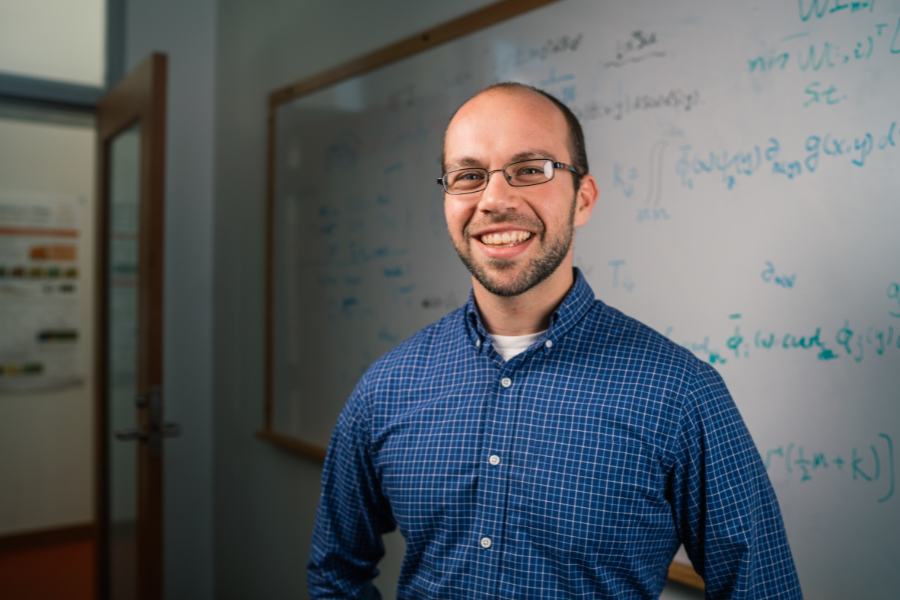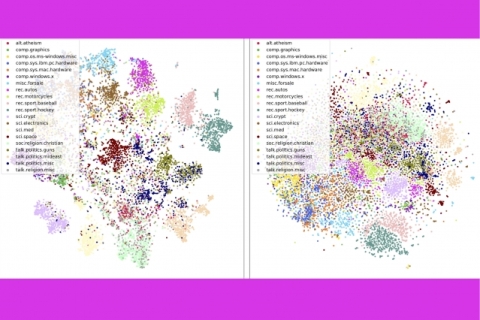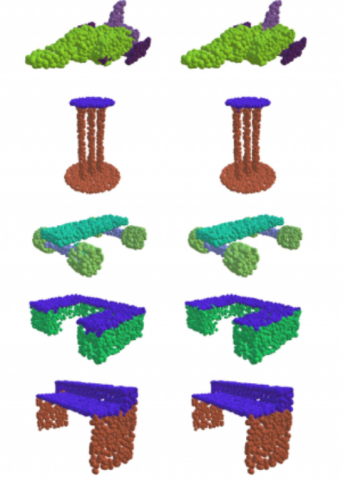Justin Solomon of the Department of Electrical Engineering and Computer Science (EECS) has been named the 2023 winner of MIT’s annual Harold E. Edgerton Faculty Achievement Award, along with fellow MIT associate professor Ellen Roche, who teaches in the Department of Mechanical Engineering (MechE).
Established in fall 1982, the award exists as a permanent tribute to the late Institute Professor Emeritus Harold E. Edgerton for his great and enduring support for younger faculty members over the years. The purpose of the award is to recognize exceptional distinction in teaching, in research, and in service.
Solomon is an associate professor of EECS and an affiliate of the MIT Computer Science and Artificial Intelligence Laboratory (CSAIL). He leads the CSAIL Geometric Data Processing group, which studies problems at the intersection of geometry, large-scale optimization, computer graphics, and machine learning. Solomon and his team have tackled a diverse array of challenges in applied geometry, from developing machine learning for 3D data to identifying geometric structures in abstract datasets, assessing compliance of political redistricting plans with civil rights law, and assisting digital artists as they create sketches and 3D models.
Solomon’s passion for geometry processing led him to create the Summer Geometry Initiative, a six-week research program designed to introduce undergraduate and graduate students alike to the field. The program, which takes place online and draws students from all over the world, was designed with equity in mind. “What we see in the graduate student pipeline is largely that the people who make it to the upper levels in [geometry processing] come from relatively few institutions and have relatively homogenous backgrounds,” Solomon explained in a 2021 interview. “So, the goal for SGI was to spark new collaboration between different labs and people who don’t normally work on this topic, while introducing a new cohort of students to geometry processing research who wouldn’t normally get a chance to work on this discipline.” To achieve his goal, Solomon structured SGI carefully, limiting the number of hours students were expected to meet online to make the program more usable to people across time zones; offering one-, two-, and three-week commitment periods for mentors to encourage more academic and industry participation; and finally, making SGI a paid experience, to lower the opportunity cost of participation. Since its inception in 2021, SGI has rapidly grown to become a hugely successful annual program with a highly competitive applicant list.
“The Department of EECS is delighted with this incredible recognition for Professor Solomon, whose remarkable work democratizes and opens his field, allowing students from all over the world to engage in collaborative research with some of the best faculty and research scientists in the discipline,” says Asu Ozdaglar, EECS department head. “Additionally, his research in the area of geometric data processing, including algorithms for processing geometric data and data processing using geometric techniques, continues to push boundaries, tackle complex challenges, and uncover new opportunities to improve our world. This honor is well-deserved.”
Solomon earned his BS, MS, and PhD from Stanford University before taking a postdoctoral appointment at Princeton University for a year and then joining MIT in 2016. Additionally, he has conducted research at Pixar Animation Studios, the University of Southern California, and the British Library Sound Archives. His textbook, “Numerical Algorithms,” was published in 2015. Solomon’s many awards and honors include the ACM SIGGRAPH Significant New Researcher Award (2022); the Seth J. Teller Award for Excellence, Inclusion, and Diversity (2022); the Google Research Scholar Award (2022); the Teaching With Digital Technology Award (2021); the Junior Bose Award (2020); the NSF BIGDATA Award (with P. Rigollet, in 2018), and the Amazon Research Award (2018).



